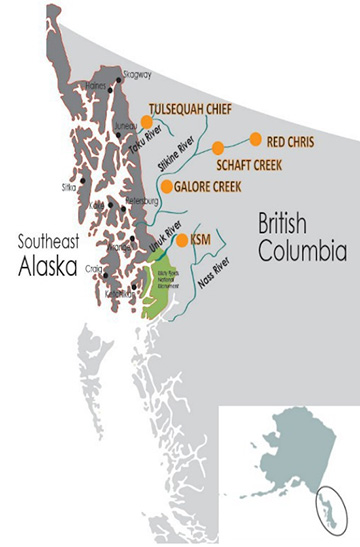
High-Ranking Alaskans Call on U.S. State Department to Intervene with Canada over BC Mine ThreatsKerry Asked to Invoke the Boundary Waters TreatyBy PAULA DOBBYN
August 21, 2014
The request comes in the wake of the Mt. Polley mine disaster in B.C. and with the Canadian province’s approval of a large-scale mine called KSM (Kerr-Sulphurets-Mitchell) near Alaska. KSM is one of several Canadian mine projects, located near international rivers flowing from B.C. into Southeast Alaska, that threaten Alaska’s multi-billion-dollar seafood and visitor industries and pose unacceptable risks to the environment. This month’s catastrophic accident at the Mt. Polley mine underscores the risk Southeast Alaska faces from large-scale B.C. mine development, including five acid-generating projects located in the Unuk, Stikine and Taku River watersheds, some of Southeast Alaska’s most productive and lucrative salmon-bearing rivers. The five mines are part of a larger mineral development push by B.C. Premier Christy Clark who has pledged to create eight new mines and expand nine more by next year. The newly constructed Red Chris mine, located in the Stikine River watershed, upstream from the Alaska communities of Wrangell and Petersburg, is set to start operations soon. Red Chris is owned by Imperial Metals, the same company that operates Mt. Polley, and is currently being blockaded by citizens of the Tahltan First Nation. The tailings dam breach at Mt. Polley unleashed an estimated 2.6 billion gallons of mine wastewater and 6 million cubic yards of sand, contaminated with tons of copper, nickel, arsenic and lead, into waterways leading to the Fraser River, one of Canada’s biggest salmon producers. The massive Aug. 4 spill coincided with the annual return of an estimated 1.5 million salmon to the Fraser River. “This failure may affect salmon stocks managed under the Pacific Salmon Treaty. A similar failure at mines proposed near the Unuk, Stikine and Taku Rivers would directly affect fishery stocks upon which commercial and recreational fishermen depend, as well as the subsistence and cultural needs of the Tlingit, Haida and Tsimshian people of my state,” wrote Sen. Mark Begich in a letter to Sec. Kerry this month. Alaska fishing and tribal leaders agree and are also calling on Sec. Kerry to act with urgency. “Our culture, food security and livelihoods depend on wild salmon. Although the mines are in Canada, the fish rely on transboundary waters as part of their life cycle and these waters know no borders. The State Department needs to ensure that these fish and the rights of our tribal citizens are respected,” said John Morris, Jr., co-chair of the United Tribal Transboundary Mining Work Group, an organization representing a broad section of Southeast Alaska’s federally recognized tribes. Dale Kelley, executive director of Alaska Trollers Association, also urges State Department action. “My organization represents over one thousand fishing families in Alaska who rely on the pristine waters of Southeast Alaska for their income. There are thousands more residents with an interest in the fish and wildlife of this region. Any threat to these waters from Canadian mines is a threat to the U.S. economy and a matter that we hope Secretary Kerry will take seriously. I realize he’s busy on a variety of diplomatic fronts, but this is an international problem on the U.S. border and we need his focus on this,” said Kelley. The Mt. Polley disaster “has renewed the specter of environmental impacts from large-scale mineral developments in Canada that are located near transboundary rivers,” wrote Sen. Lisa Murkowski to Kerry on Aug. 8. “This incident should compel the State Department to evaluate additional steps that may be warranted to safeguard U.S. interests.” Congressman Don Young also called for Kerry’s help, specifically on the proposed KSM mine near Ketchikan. KSM is a massive gold and copper open-pit mine project about 19 miles north of Alaska’s border that has already received B.C. provincial approval. The Canadian federal government is currently evaluating the project and is expected to make a decision this fall. Alaskans, including three state commissioners and several Alaska legislators, and the Petersburg Vessel Owners Association, have called on the Canadian federal government to elevate the environmental review of KSM to the highest possible level, a process called a Panel Review. “Alaskans will face only downstream risk associated with KSM but will gain no direct employment or other economic benefits from this project. While there are no absolute guarantees that a Panel Review would prevent a catastrophe like what just happened at Mt. Polley, that level of scrutiny is the only thing that gives us any assurance that a similar catastrophe won’t happen again, this time polluting Alaska’s rich fishing grounds,” said Brian Lynch, executive director of the Petersburg organization, which represents over 100 commercial fishermen and businesses operating primarily in Southeast Alaska. Since last fall when the KSM mine underwent provincial review, more than 1,000 Alaskans have weighed in with public comments, asking for more scrutiny of KSM, as well as the other transboundary mineral developments, and for State Department intervention. Many have cited the Boundary Waters Treaty between the U.S. and Canada as a tool Kerry could use to address the threats to Alaska imposed by the B.C. mines. The treaty states “that the waters herein defined as boundary waters and waters flowing across the boundary shall not be polluted on either side to the injury of health or property on the other side.” “Using the Boundary Waters Treaty might get the Canadians’ attention. At least it would start the conversation,” said Lynch.
Source of News:
|
|||
